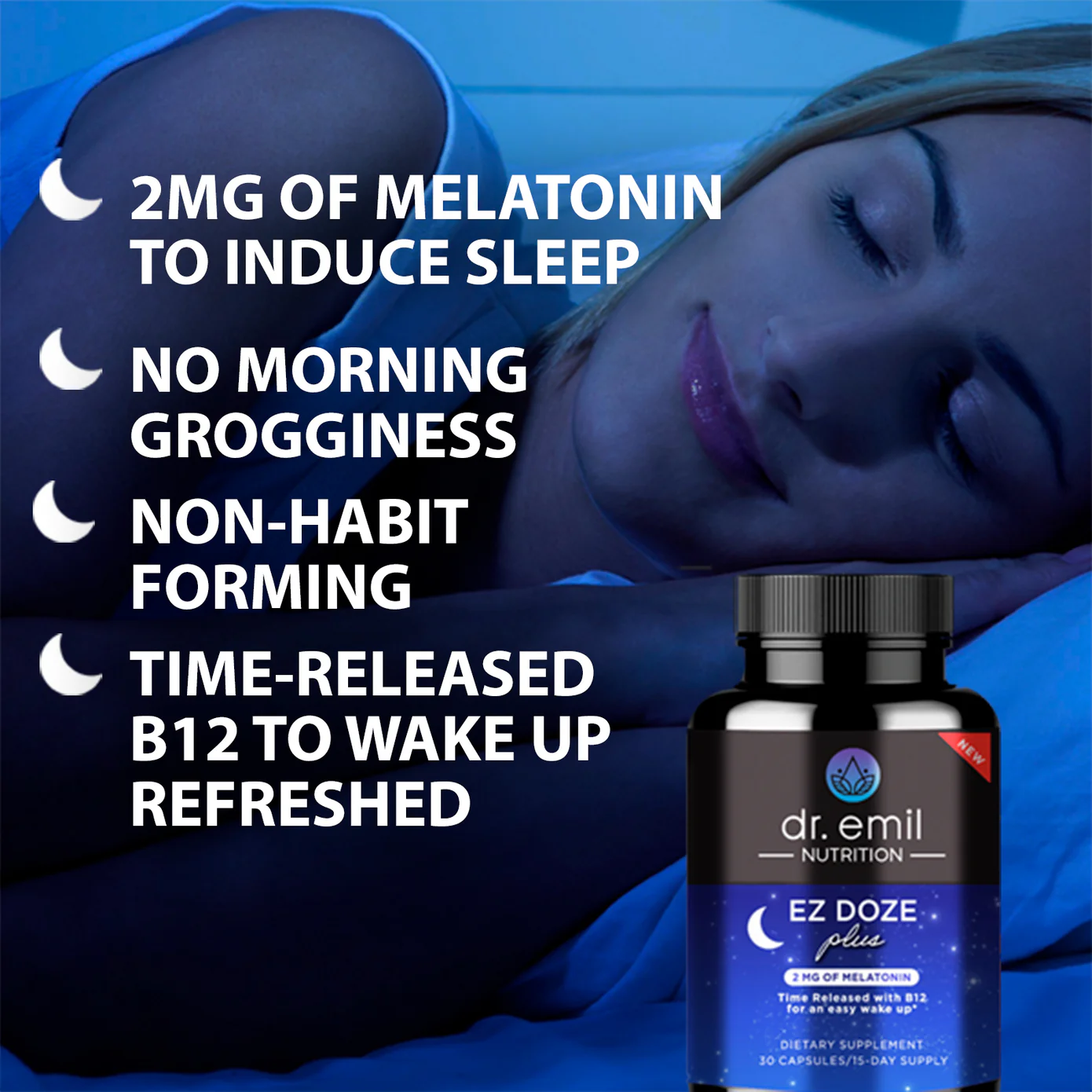With millions of people worldwide being affected by sleep difficulties, many seek relief through melatonin supplements. As one of the most popular over-the-counter sleep aids, melatonin has gained widespread acceptance for its natural origins and perceived safety profile. However, with increasing accessibility and varying product strengths on the market, questions about melatonin safety have become more pressing. Can you take too much melatonin? What happens when you exceed recommended doses? While melatonin overdoses are extremely rare and generally non-fatal, understanding the boundaries of safe consumption is essential for anyone considering or currently using this supplement. We’ll examine the science behind melatonin toxicity, explore what constitutes excessive intake, and provide practical guidance for safe and effective use of this popular sleep aid.
What is Melatonin?
Natural Hormone vs. Synthetic Supplements
Melatonin exists naturally within the human body as a crucial hormone produced by the pineal gland, a small structure located deep within the brain. This endogenous melatonin serves as the body's primary timekeeper, orchestrating our biological rhythms and signaling when it's appropriate to sleep or remain alert. The pineal gland synthesizes melatonin from the amino acid tryptophan through a complex biochemical pathway involving serotonin as an intermediate compound.
Synthetic melatonin supplements are laboratory-created versions of this natural hormone, designed to mimic the molecular structure and function of endogenous melatonin. These supplements are typically derived from pharmaceutical synthesis rather than animal sources, making them suitable for vegetarians and vegans. The synthetic version is chemically identical to naturally produced melatonin, allowing it to bind to the same receptors and produce similar physiological effects. Unlike many other hormones that require prescription oversight, melatonin supplements are classified as dietary supplements in most countries, making them readily available without medical supervision.
How Melatonin Regulates Sleep-Wake Cycles
The mechanism by which melatonin influences sleep involves intricate interactions with our circadian rhythm system. Throughout the day, exposure to bright light suppresses melatonin production, keeping us alert and awake. As evening approaches and environmental light diminishes, the pineal gland receives signals through a pathway involving the eyes, hypothalamus, and sympathetic nervous system to begin releasing melatonin into the bloodstream.

This evening surge in melatonin levels doesn't directly cause sleep but rather creates the physiological conditions conducive to sleep onset. Melatonin works by binding to specific MT1 and MT2 receptors located throughout the brain, particularly in areas responsible for sleep regulation. These receptors respond to melatonin by reducing neural activity, lowering core body temperature, and decreasing alertness, all of which prepare the body for sleep.
The timing of melatonin release is crucial for maintaining healthy sleep patterns. Disruptions to this natural rhythm, whether from shift work, jet lag, or exposure to artificial light at night, can significantly impact sleep quality and overall health. Modern lifestyle factors, particularly the use of electronic devices that emit blue light, can suppress natural melatonin production and delay sleep onset.
Common Dosage Forms and Concentrations
Melatonin supplements are available in numerous formulations, each designed to address different sleep challenges and user preferences. Immediate-release tablets and capsules are the most common forms, typically available in doses ranging from 0.5mg to 10mg. These formulations are absorbed quickly into the bloodstream, making them ideal for individuals who primarily struggle with falling asleep rather than staying asleep.
Extended-release or time-release formulations provide a more gradual release of melatonin throughout the night, better mimicking the body's natural sustained melatonin production. These products are particularly beneficial for people who wake frequently during the night or experience early morning awakening. Liquid melatonin offers the advantage of precise dosing, allowing users to adjust their intake in small increments and making it easier to find the minimal effective dose.
Sublingual tablets and strips dissolve under the tongue, potentially offering faster absorption than traditional oral forms. Gummy formulations have gained popularity for their palatability, though they often contain higher doses than necessary and may include added sugars. Some products combine melatonin with other sleep-promoting ingredients like valerian root, chamomile, or magnesium, creating synergistic formulations designed to address multiple aspects of sleep difficulty.

Can You Actually Overdose on Melatonin?
Definition of Overdose vs. Excessive Intake
Understanding the distinction between a true overdose and excessive intake is fundamental when discussing melatonin safety. A classical overdose implies consuming a quantity of a substance sufficient to cause severe toxicity, organ damage, or death. In medical terms, an overdose typically results in life-threatening symptoms that require immediate emergency intervention and may have lasting health consequences.
Excessive melatonin intake, by contrast, refers to consuming more than the recommended or therapeutically effective amount, which may lead to unpleasant but generally non-dangerous side effects. With melatonin, what many people describe as an "overdose" is more accurately characterized as excessive intake that produces uncomfortable symptoms like prolonged drowsiness, headaches, or digestive upset. These effects, while bothersome, are typically temporary and resolve as the body metabolizes and eliminates the excess melatonin.
The confusion between overdose and excessive intake often stems from the wide availability of high-dose melatonin products and the common misconception that "more is better" when it comes to supplement effectiveness. Many commercial products contain doses far exceeding what research suggests is necessary for sleep promotion, leading users to inadvertently consume excessive amounts.
Lack of Established Lethal Dose
One of the most reassuring aspects of melatonin safety is the absence of any documented lethal dose in adults. Extensive research and decades of clinical use have failed to identify a quantity of melatonin that poses fatal risks to adults. Studies examining extremely high doses, sometimes hundreds of times greater than typical supplemental amounts, have not resulted in death or severe toxicity.

This remarkable safety profile distinguishes melatonin from many other sleep aids, particularly prescription medications that have well-defined toxic dose ranges. However, the absence of a known lethal dose should not be interpreted as permission to consume unlimited quantities, as excessive intake can still produce significant discomfort and interfere with normal sleep patterns.
Why Melatonin is Considered Relatively Safe
Several factors contribute to melatonin's reputation as a relatively safe supplement, even when consumed in quantities exceeding recommended doses. First, melatonin is a naturally occurring hormone that the body already produces and metabolizes efficiently. The liver processes melatonin through well-established enzymatic pathways, and the kidneys eliminate metabolic byproducts without significant strain on these organ systems.
The hormone's mechanism of action also contributes to its safety profile. Unlike sedative medications that suppress central nervous system function, melatonin works by gently influencing natural sleep-promotion pathways. It doesn't force unconsciousness or significantly depress vital functions like breathing or heart rate. Instead, it enhances the body's existing sleep mechanisms, making dangerous respiratory depression or cardiac complications extremely unlikely.
Additionally, melatonin's short half-life means that even excessive amounts are cleared from the body relatively quickly. Most people metabolize and eliminate excess melatonin within several hours, reducing the duration of any adverse effects. This rapid clearance prevents accumulation in body tissues and minimizes the risk of long-term toxicity, even with repeated excessive intake.

Signs and Symptoms of Taking Too Much Melatonin
Consuming excessive amounts of melatonin can produce a range of uncomfortable symptoms that typically manifest within hours of ingestion and may persist into the following day. Immediate effects often include overwhelming drowsiness that extends well beyond the intended sleep period, making it difficult to wake up or remain alert when necessary. Users may experience significant dizziness or lightheadedness, particularly when changing positions, which can increase the risk of falls or accidents.
Headaches represent another common immediate symptom of melatonin excess, ranging from mild tension-type discomfort to more severe throbbing pain. Some individuals report feeling confused or experiencing difficulty concentrating, as if their thinking has become clouded or slowed. Nausea and gastrointestinal distress frequently accompany excessive melatonin intake, with some people experiencing stomach pain, cramping, or digestive irregularities.
Next-day effects can be particularly problematic for daily functioning. Morning grogginess often persists well into the day, creating what many describe as a "hangover" effect that impairs work performance and social interactions. Mood changes are also common, with users reporting increased irritability, anxiety, or even temporary depressive feelings. These emotional effects may stem from disrupted sleep architecture and the body's struggle to process excess hormone levels.
Perhaps most concerning is the potential for sleep cycle disruption when melatonin is taken in excessive quantities or at inappropriate times. Rather than improving sleep, too much melatonin can actually fragment sleep patterns, cause vivid or disturbing dreams, and lead to frequent nighttime awakenings. This paradoxical effect highlights the importance of proper dosing, as the goal is to support rather than override the body's natural sleep mechanisms.

Recommended Dosages and Safe Limits
Research consistently demonstrates that effective melatonin supplementation requires much smaller doses than many commercial products contain. Typical therapeutic doses range from 0.5mg to 3mg, with many sleep specialists advocating for starting at the lowest possible effective amount. Studies have shown that doses as small as 0.3mg can be sufficient for addressing circadian rhythm disruptions, while 1-2mg often proves adequate for general sleep onset difficulties.
Higher doses may be medically appropriate in specific circumstances, such as treating certain sleep disorders, managing jet lag across multiple time zones, or addressing sleep issues in individuals with developmental disabilities. Some research protocols have safely used doses up to 10mg for particular conditions, though these applications typically occur under medical supervision and for defined treatment periods.
Individual sensitivity to melatonin varies dramatically, with some people responding strongly to doses as low as 0.25mg while others may require 3mg or more to achieve desired effects. Factors influencing sensitivity include age, body weight, natural melatonin production levels, and genetic variations in hormone metabolism. This wide variation underscores the importance of individualized dosing rather than following one-size-fits-all recommendations found on product labels.
Dr. Emil’s Premium Sleep Solutions
Dr. Emil Nutrition stands at the forefront of evidence-based supplement formulation, combining medical expertise with rigorous scientific research to create products that deliver results without compromising safety.
EZ Doze Plus

EZ Doze Plus delivers comprehensive sleep support through a doctor-formulated blend featuring 2mg melatonin combined with GABA, St. John's Wort, and L-Theanine for fast-acting results. This premium formulation calms both mind and body to ease restlessness and promote faster sleep onset without dependency-forming ingredients commonly found in OTC sleep aids. The innovative time-released capsule design ensures sustained nutrient delivery throughout the night, while a B12 component helps users wake up refreshed rather than groggy. This non-habit-forming formula allows for regular use, making it ideal for individuals seeking effective, science-backed sleep enhancement without morning fatigue or tolerance development concerns.
Bedtime Burn

Bedtime Burn revolutionizes nighttime supplementation by combining sleep enhancement with metabolic support, recognizing the crucial connection between quality rest and healthy metabolism. This stimulant-free formula addresses nighttime cravings while promoting restorative sleep through carefully selected calming ingredients. The product's melatonin content works synergistically with appetite-suppressing compounds to prevent late-night eating that disrupts sleep quality. Natural fat-burning ingredients like white kidney bean extract and chromium support metabolic processes during sleep, optimizing overnight repair cycles. Unlike typical fat burners that rely on stimulants, Bedtime Burn's calming formulation enhances sleep quality while supporting metabolic function, making it valuable for individuals struggling with sleep-disrupting food cravings.

While true melatonin overdoses remain extremely rare and non-fatal, understanding proper usage guidelines ensures optimal benefits while minimizing unwanted effects. The key to successful melatonin supplementation lies in starting with minimal effective doses, timing intake appropriately, and recognizing that individual responses vary significantly. High-quality formulations like those offered by Dr. Emil Nutrition provide scientifically-backed approaches to sleep enhancement that prioritize both effectiveness and safety, helping users achieve restorative sleep without the risks associated with excessive supplementation.






